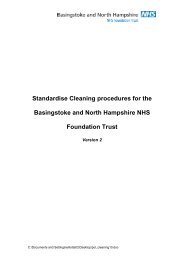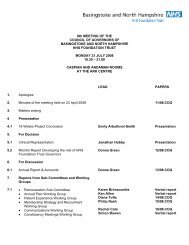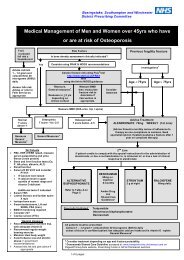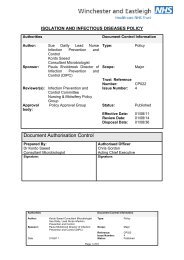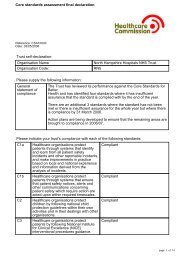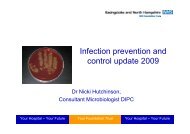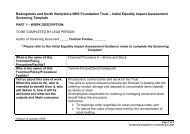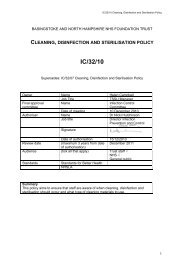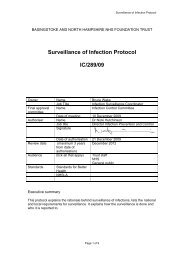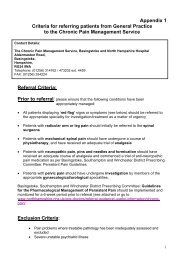Policy for the management and control of diarrhoea and vomiting
Policy for the management and control of diarrhoea and vomiting
Policy for the management and control of diarrhoea and vomiting
Create successful ePaper yourself
Turn your PDF publications into a flip-book with our unique Google optimized e-Paper software.
Winchester & Eastleigh Healthcare NHS Trust<br />
POLICY FOR THE MANAGEMENT AND CONTROL OF DIARRHOEA<br />
AND VOMITING (NOROVIRUS) INFECTIONS<br />
his/her advice <strong>and</strong> agreement. If appropriate <strong>the</strong> Consultant Microbiologist<br />
will seek advice from <strong>the</strong> HPA.<br />
11.7 All linen from isolation areas should be treated as infected linen <strong>and</strong> disposed<br />
<strong>of</strong>f as per <strong>the</strong> infected linen policy.<br />
12 H<strong>and</strong> Hygiene<br />
12.1 The h<strong>and</strong>s <strong>of</strong> healthcare staff can provide <strong>the</strong> vehicle <strong>for</strong> <strong>the</strong> transmission <strong>of</strong><br />
this infection. Fur<strong>the</strong>rmore a lack <strong>of</strong> h<strong>and</strong> hygiene among healthcare staff is a<br />
well recognised problem nationally. It is <strong>the</strong>re<strong>for</strong>e essential that all staff wash<br />
<strong>the</strong>ir h<strong>and</strong>s when required using <strong>the</strong> correct h<strong>and</strong> washing technique to help<br />
reduce <strong>the</strong> risk <strong>of</strong> transmission, as per CP073 H<strong>and</strong> hygiene <strong>Policy</strong>. A<br />
12.2 Alcohol gel is not effective against <strong>the</strong>se viruses <strong>and</strong> <strong>the</strong>re<strong>for</strong>e h<strong>and</strong>s must be<br />
washed with soap <strong>and</strong> water be<strong>for</strong>e <strong>and</strong> after every patient contact <strong>and</strong> after<br />
contact with potentially infectious equipment, furnishings or o<strong>the</strong>r fomites.<br />
Please refer to CP073 H<strong>and</strong> hygiene <strong>Policy</strong> <strong>for</strong> fur<strong>the</strong>r details.<br />
12.3 Wearing gloves do not obviate <strong>the</strong> need to wash h<strong>and</strong>s.<br />
12.4 Patients must be provided with <strong>the</strong> opportunity to wash <strong>the</strong>ir h<strong>and</strong>s or use<br />
h<strong>and</strong> wipes after each toileting episode <strong>and</strong> also be<strong>for</strong>e each meal. H<strong>and</strong><br />
washing with soap <strong>and</strong> water is always preferable.<br />
13 Personal Protective Clothing<br />
13.1All staff must put on a yellow plastic apron <strong>and</strong> non-sterile gloves be<strong>for</strong>e<br />
entering an affected bay or side room. These should be removed <strong>and</strong> h<strong>and</strong>s<br />
washed with soap <strong>and</strong> water be<strong>for</strong>e leaving <strong>the</strong> room or bay. Any failure to<br />
comply with <strong>the</strong> wearing <strong>of</strong> protective clothing <strong>and</strong> h<strong>and</strong> washing during an<br />
outbreak should be notified to <strong>the</strong> ward manager <strong>and</strong> <strong>the</strong> IPC team. Failure <strong>of</strong><br />
compliance may constitute a clinical incident. Outbreaks <strong>of</strong> D&V can be<br />
contained if all staff follow <strong>the</strong>se instructions. Refer to <strong>the</strong> CP076 <strong>Policy</strong> <strong>for</strong><br />
<strong>the</strong> St<strong>and</strong>ard Precautions <strong>and</strong> PPE (Personal Protection Equipment) <strong>for</strong><br />
guidance.<br />
13.2 There is currently no evidence to justify <strong>the</strong> wearing <strong>of</strong> face masks routinely<br />
<strong>for</strong> ei<strong>the</strong>r patients or staff.<br />
14 Movement <strong>of</strong> Affected Patients<br />
14.1If a patient is symptomatic, his/her visit to ano<strong>the</strong>r department should be<br />
delayed unless clinically urgent, as it will be distressing <strong>for</strong> <strong>the</strong> patient if an<br />
episode <strong>of</strong> <strong>diarrhoea</strong> or <strong>vomiting</strong> occurs during transit. Fur<strong>the</strong>rmore this will<br />
also unnecessarily expose more contacts to <strong>the</strong> infection <strong>and</strong> may result in<br />
Authorities<br />
Document Control In<strong>for</strong>mation<br />
Author:<br />
Dr Parnaby<br />
Type:<br />
<strong>Policy</strong><br />
Consultant Microbiologist<br />
Sponsor: Members <strong>of</strong> <strong>the</strong> Infection Prevention & Scope:<br />
Major<br />
Control Committee<br />
Reference:<br />
CP101<br />
Issue Number: 2<br />
Date July 2011 Status: Published<br />
Page 12 <strong>of</strong> 26



